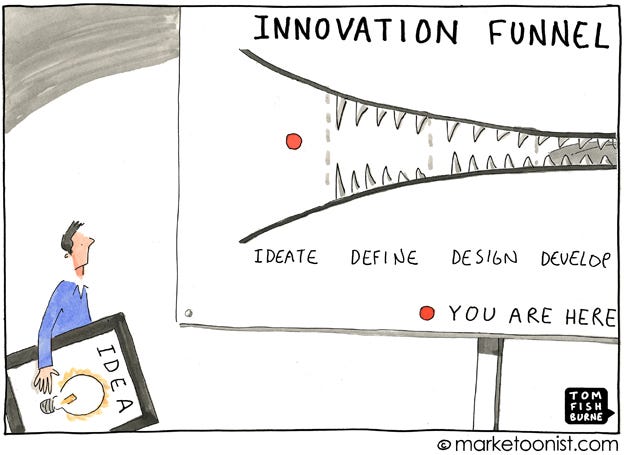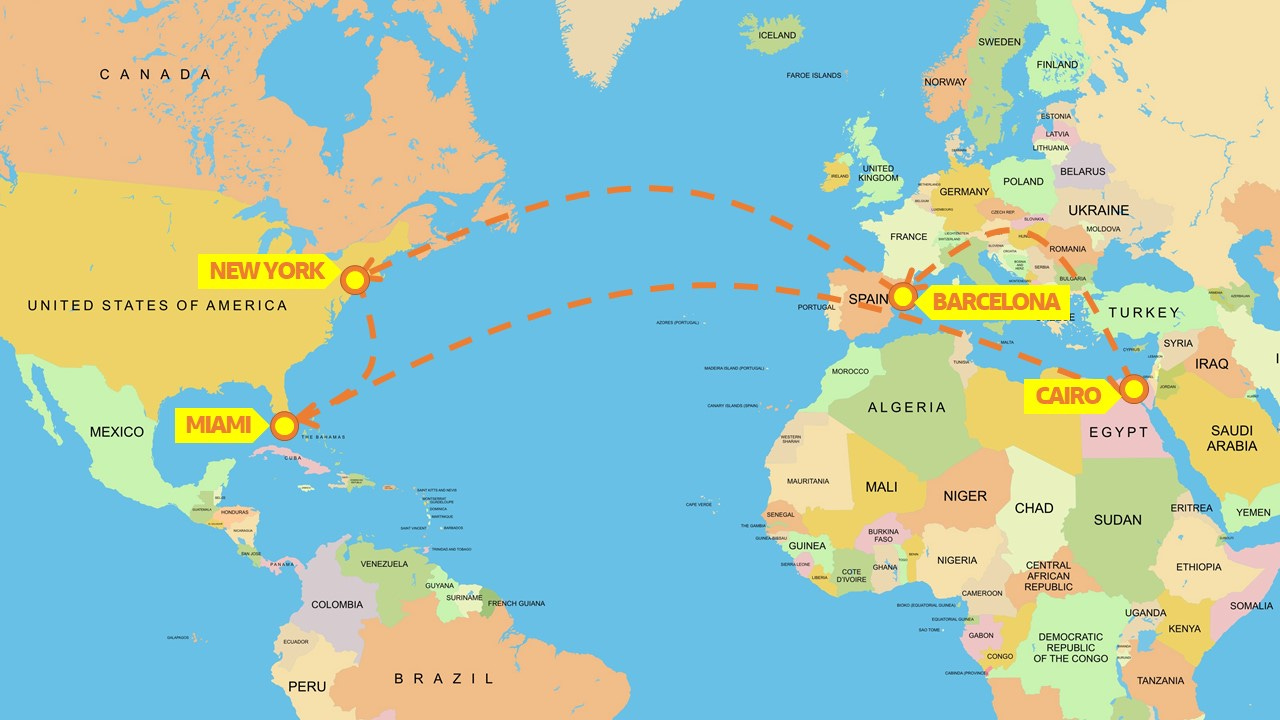After I exited my startup, I was wondering what I would do with my life. It was around this time that I decided to dabble at angel investing. Suffice it to say, I was terrible at it.
Fortunately, I met others that had been investing for much longer. I would meet these battle-scarred veterans of the startup scene at angel investor events, pitch competitions, and startup conferences. It was at one of these events that I connected with a prolific angel investor and co-investor into a few companies I had also invested.
While we talked about a lot of things, one thing in particular stuck with me during our conversation. I had asked him about startups that seem to at first do okay, but then all of sudden stall out, become zombies, and eventually fold.
“This happens with every company when they no longer innovate, whether big or small. When innovation stops, a company stops being valuable. You evolve, iterate, or die!”
For context, my startup was in the HR tech industry. One thing I noticed was how many HR tech startups seemed to have fast initial growth, then plateau without ever hitting scale or finding an exit. When the financial crisis hit in 2008, it managed to kill off many of these startups that no longer had a VC lifeline or customers that had the need for software to better hire and manage employees.
What my newfound investor friend was pointing out is that innovation is how companies thrive over time. Every company starts out with an idea and a market. For Coca-Cola, it was a carbonated beverage. For Apple, it was personal computers. For Amazon, it was selling books on the Internet. Over time, companies innovate, improving the original idea, then launching new ideas.
Why? Because this is what customers ask for! In his 2017 Shareholder Letter, Jeff Bezos, founder of Amazon, said the following about customers:
One thing I love about customers, is that they are divinely discontent. People have a voracious appetite for a better way, and yesterday’s ‘wow’ quickly becomes today’s ‘ordinary'.
Customers want and expect innovation from the companies they spend money with. We see this all the time with consumer electronics, fashion, and food. Remember those epic lines at Apple stores to get the latest iPhone model?
That same dynamic happens in the B2B world, though without as much hoopla or attention. Business is never static, and in fact change is accelerating. Companies need new things because their needs change, even if they do not realize it, as Bezos cites in his 2016 Shareholder letter:
Customers are always beautifully, wonderfully dissatisfied, even when they report being happy and business is great. Even when they don’t yet know it, customers want something better, and your desire to delight customers will drive you to invent on their behalf.
The history of business is littered with case studies of companies that failed to innovate. Kodak, Xerox, Blockbuster, Yahoo, and many others had a virtual lock on the market in their heydays, only to sputter and collapse in the wake of more nimble and focused competitors that ate their market share. They suffer from a combination of hubris and fear. Hubris in that they believe they know everything about the market and fear that creating anything new will disrupt their existing cash cow business.
This same lack of innovation also happens within startups. The idea of “evolve, iterate, or die” was partly my motivation for joining Stack Overflow eight years into their journey. After some early attempts to monetize the traffic to their hugely successful Q&A website for developers, they settled on selling job postings and advertising on their website. In essence, the business model was built to convert eyeballs for companies looking to sell tools and to recruit developers.
One inherent flaw in the model though is that monetizing eyeballs is hard to scale as a venture backed business. This is not to say it cannot be done, but for a community-driven site like Stack Overflow, it can be particularly tricky to do successfully without the community reacting negatively. Realizing the limits of scaling the business, they overcame hubris and fear to explore selling Stack Overflow as a service.
This was a bold move by Joel Spolsky and the leadership team. When I joined to commercialize this new SaaS business for developer knowledge, we were a team of six with very little support from other teams. It was sink or swim. Fortunately, we not only stayed afloat, but quickly became the largest contributor of revenue. The success of the Teams business eventually led Stack Overflow to be acquired a few years later for $1.8 billion.
Not many stories have a happy ending. Every startup I have ever worked with has hit “the plateau”. This often happens because the founders misread product-market fit. They stop evolving to focus on scaling the business and placing all their bets on the existing product. The startup becomes a one-trick pony, and when growth stalls, panic ensues.
The right approach would be to reassess the current business, dive deeper into problems customers are facing, pivot to address a more viable market, and iterate till product gains traction. Most founders will assume however the problem is the go-to-market or product execution, churning through different strategies and leaders in a desperate scramble to eke out any further growth.
Admittedly, it is hard to evolve when it means potentially killing your existing business. Netflix faced this in the switch from mailing DVD’s to streaming, then did it again when they shifted from owned data centers to the cloud. Apple did it by venturing into devices with the successful launch of the iPod.
Bezos noticed this hesitance for companies to “disrupt themselves”. It is an organizational challenge, that balance of hubris and fear, that prevents progress and invention:
If you’re going to invent, you’re going to disrupt. A lot of entrenched interests are not going to like it. Some of them will be genuinely concerned about the new way, and some of them will have a vested self-interest in preserving the old way.
From a personal perspective, I also think about my own journey to evolve, iterate, or die. The leaps from commodities trader to developer, developer to sales, corporate to startup, and then back in corporate certainly do not indicate a willingness to make drastic changes! We all can fall into the trap however of the sunk cost fallacy, putting work into something because it is comfortable, rather than productive.
As I looked back at the last few years, one of those sunk cost activities that stood out to me was this newsletter. It started as a labor of love and also a necessity for generating more awareness of Stack Overflow Teams. This small project eventually turned into a repository of 215 essays exploring topics such as developer culture, enterprise tech, engineering leadership, and organizational alignment. All told, I have written over 300,000 words from July 2017 till July 2022, mostly on a weekly basis with the occasional pause for much needed holidays to rejuvenate.
I am proud of this body of work. It managed to inspire over 4,000 subscribers across Substack and Medium, counting many corporate technology leaders and engineering managers as readers. I would even get the occasional kind note by readers about how insightful they found my writing or how they shared it in meetings. It also benefitted me personally as a door opener that led to deals, invites to speak at events, and even my role at AWS.
What I came to realize though is that this newsletter no longer aligns to what is most impactful to my work and interests. I reluctantly paused the newsletter last summer to reevaluate the importance of this newsletter to my AWS activities, especially in light of my heavy travel schedule. The topics that were now most meaningful had shifted to startups and cloud technology.
So today I am announcing this is the final edition of DEVBIZOPS. I will still leave the newsletter here as it has been and continues to be helpful to many people. This is not the end however, I am launching a newsletter focused on startups called “Founders in the Cloud” that I invite you to subscribe for free.
What will “Founders in the Cloud” cover? I’ll dive into a range of topics from engineering to product to sales & marketing and more, with a lens on practical advice and tools for entrepreneurs looking to launch and grow their startup. I will also cover broader trends in tech and business like Generative AI, cloud tech, funding, etc. What will stay the same is the essay format and community updates.
Something that will change however is a new collaborator, Basil Fateen. He joined my Startup Advocate team late last year to cover EMEA and is based in Dubai. He is a former startup founder, prolific content creator, and excellent speaker, who will share his own perspectives on the intersection of startups and cloud technology.
I encourage you to check out the newsletter, subscribe, and share with others that would benefit from a fresh perspective on the startup world. And I sincerely thank you for sticking around this long to support DEVBIZOPS. Signing off,
Mark Birch, Editor & Founder of DEVBIZOPS
For this last community update of the DEVBIZOPS newsletter, and I also happen to be hitting the road again, going to the following cities for some excellent conferences and community activities:
🔴 Miami - Tech Week - Wed, Apr 26
🔴 Cairo - AfricArena - Sat, Apr 29th - Tue, May 2nd
🔴 Barcelona - Avalanche Summit - Wed, May 3rd - Fri, May 5th
Catch me if you are going to be at any of these events. Glad to meet up to talk all things AWS, developer topics, startups, or just to say hi!






